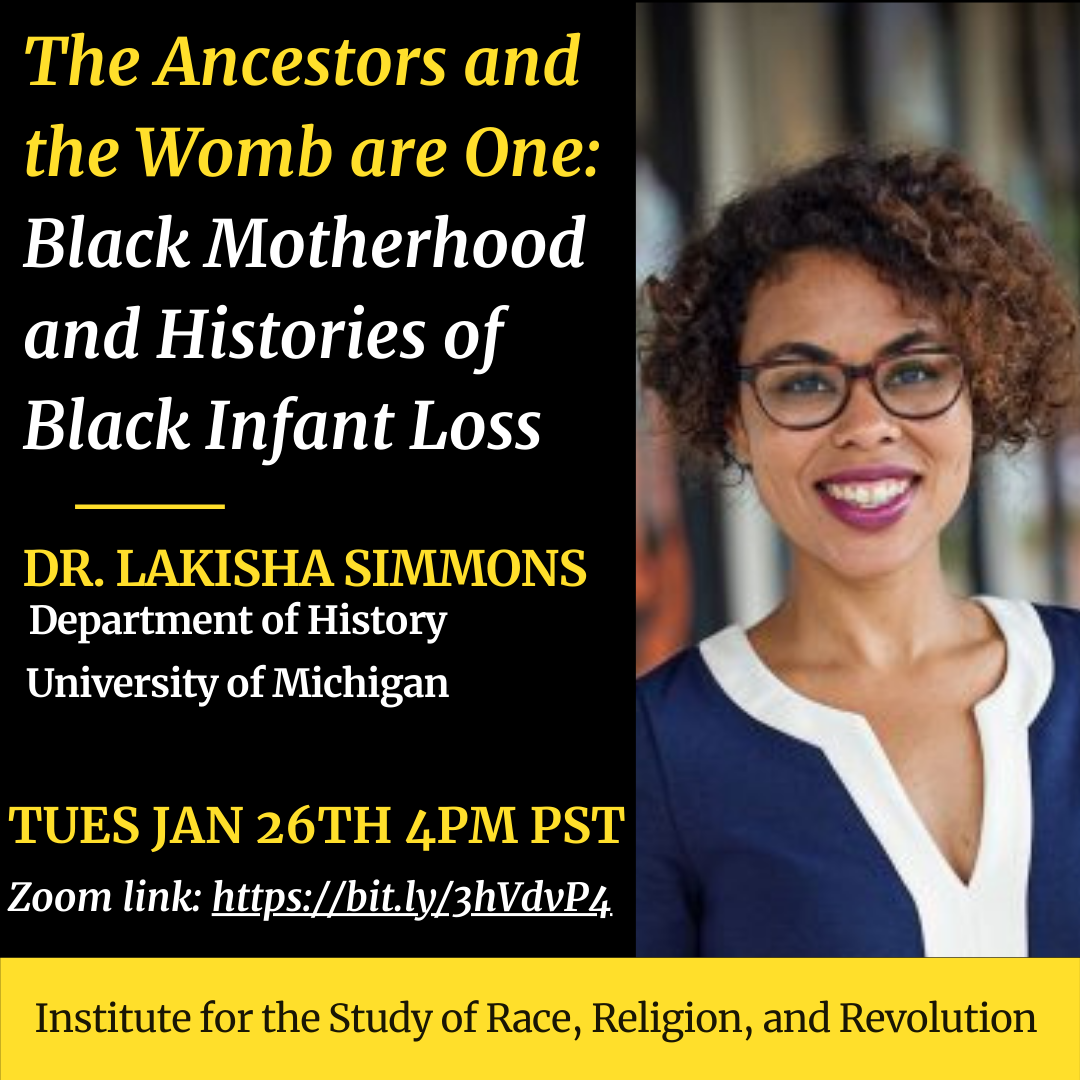
- This event has passed.
ISRRAR Event–Dr. LaKisha Simmons, “The Ancestors and the Womb are One: Black Motherhood and Histories of Black Infant Loss”
January 26, 2021 @ 4:00 pm - 6:00 pm

Throughout the twentieth century, Black women in the United States experienced at least double the rates of infant mortality experienced by white women. Through an analysis of oral histories collected in the US South in the 1930s, Dr. LaKisha Simmons (University of Michigan) details what Patricia Hill Collins terms a “Black women’s standpoint on mothering.” From interviewees’ discussions of infant and child loss emerge twin concepts of generation and Black relationality, which enable a theory of Black motherhood as connected to survival and remembrance. The concept of generation reveals how Black women in the 1930s defined themselves as mothering their children after Emancipation and yet as inheriting the ever-present enslaved past through their own mothers and grandmothers. Black women articulated a sense of self and well-being that was in conversation with the ancestors and unborn.
Join this Zoom event here: https://bit.ly/3hVdvP4.
This event is part of the ISRRAR Winter Quarter series.
Professor Butch Ware and the ISRRAR announce the Winter Quarter schedule for HIST 210RA: Race, Faith, Revolution. Graduate students are invited to register for this 2-unit seminar and to sign up for the listserv at http://tinyurl.com/ISRRARListServ.
How have Black metaphysics articulated with racial politics in order to advance efforts of justice, liberation, and self-actualization? In this very special year of 2021, our seminar will take on manifestations of anti-black racism and imperialism, as well as African and African Diasporic efforts to mediate between the seen and unseen worlds in struggles for justice.
This graduate seminar is part of a broader collaborative process meant to engage graduate students and faculty alike. The Initiative for the Study of Race, Religion, and Revolution (ISRRAR) seeks to foster a conversation on intersections of spirituality and social change wherein works on (and by) formerly colonized peoples are central, rather than peripheral.
This approach is driven by an axial critique of the ways in which modernity’s core contradictions shape our shared pasts and presents. An era of revolutionary enlightenment, we are told, brought humanity out of the ‘dark ages.’ Freedom dawned. But this ‘age of lights’ brought the darkest of racial taxonomies, and scales of slavery and human suffering unknown to ancient and medieval worlds. Reason proclaimed its mission: liberate humanity from the bondage of irrational religion. Yet rational political economies brought global empires, world wars, and ethnic genocides. Moreover, new nationalisms have drawn on older religious repertories to define citizens and subject them to moral authority. Self-congratulatory Western tropes, however, tend to overlook the ubiquity of race and the persistence of faith, portraying them as incidental rather than fundamental.
Colonized peoples in Africa and the Americas, tell different tales. A generation of emergent scholarship has brought these forward. Scholars (many trained in interdisciplinary fields) have recovered ‘native’ narratives and ontologies of the oppressed, often dislodging dominant meta-narratives in the study of the global West. In History 210 we engage live presentations of the works of scholars, activists, and artists whose conceptualization and execution of their research breaks new ground in these domains.
